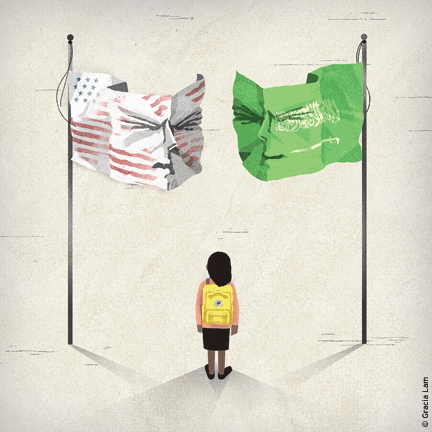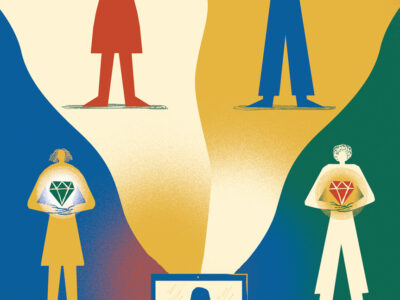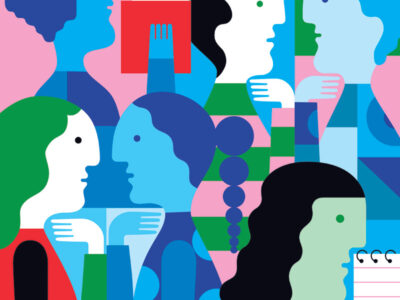
How 9/11 shaped my fourth-grade year in Saudi Arabia.
By Meher Rehman
On September 11, 2001, I was living in Saudi Arabia. At the moment the first tower collapsed and panic erupted in lower Manhattan, I was sitting in an American school in Jubail, a small city located on the coast. I had moved to Jubail when I was six years old from Pakistan, the country where I was born. My childhood in Pakistan had been as blissful as a warm embrace; I remember waiting for the muezzin’s call to prayer in the evening, dancing in a shimmering kaleidoscope of color at Eid, the holiday that marks the end of Ramadan; picking ripe mangoes from the tree in my garden; and living a life in happy ignorance that a world existed beyond what I had always known. But that changed when my father accepted a job working as a chemical engineer for SABIC, a manufacturing and hydrocarbon company in Saudi Arabia.
Our move to Saudi Arabia remains a vivid memory for me. The mystique of women draped in layers of black cloth, masking their bodies and identities, fascinated me. I watched nomads drift through the desert landscape, riding proud atop their camels, something I had only seen before in movies. I remember the calmness of the pristine coastline of the Arabian Sea, where oil-industry lights twinkled in the night. Our residency was never meant to be permanent. Like all other expatriates working in the kingdom, we had come on a temporary work visa. But life there was comfortable, and my family settled in well. After 9/11, however, I would realize that I was still considered a foreigner in the country I was beginning to consider my home.
While living in Jubail, I attended a private American school for the children of expatriates; since none of us spoke Arabic, we could not attend the public schools in Saudi Arabia. As time passed I became more and more comfortable, fitting in easily among my classmates—since I was preoccupied with the same things as most other nine-year-old girls: Harry Potter, Britney, making friendship bracelets. But 9/11 would make the differences between us clear.
The initial reaction of my peers to 9/11 was not different from that of other Americans: dismay, confusion, and shock commingling with fear. Fear increased as suicide bombers detonated themselves in gated communities for Western foreigners. Tanks and soldiers were soon situated at the entrances of these housing developments, but paranoia seeped in through the gates. Our school installed metal detectors and we practiced bomb drills. High electric fences separated us from the public. Car-bomb explosions occurred weekly. Death threats were sent. The message was clear: Leave.
As paranoia infiltrated the school, I found myself ostracized by my classmates. Because I was Muslim and looked similar to Arabs—like the few who were responsible for 9/11, whose faces were plastered across the media—my Caucasian classmates viewed me with uncertainty that sometimes turned into hostility. Slowly but steadily, the divide between us increased. Whispers rustled around me: Terrorists … Muslims … Murderers. I became adept at understanding the unsaid words and interpreting the awkward pauses. I could feel fear developing into hatred.
At the same time that I faced prejudice from my classmates, I became the target of hostility from Saudi locals. After Afghanistan and Iraq were invaded, Saudi antagonism against Americans burgeoned. That antipathy extended to me, since I belonged to the American school. The animosity of Western residents was reciprocated by Saudi natives—a portion of whom vehemently supported Osama Bin Laden. People whispered about donation drives to fund Bin Laden. Riots supporting Bin Laden ensued in the streets of my native Pakistan. Loud voices blared on television, chanting cries against America. I still recall the sight of little boys flourishing toys with Bin Laden’s face plastered on them—the man hunted as a villain in the West was viewed as the savior of the Muslim East. As a Muslim, I felt frustrated as I tried to reason my way through how a religion of peace and brotherhood could be misused as a catalyst for murder.
Slowly, the sparks of hostility blazed into a conflagration of hatred. Helplessly, I felt the two camps close ranks on either side of me. Estranged from some Muslims and ostracized by some Westerners, I became a refugee, displaced amid the bitter conflict between East and West.
Ten years later, I still reflect on the moment that distorted the decade that followed. The gulf that opened up on that Tuesday morning has grown. In nearly an instant, the world changed, and a single morning’s event changed everyone’s perceptions of “Muslim” and “American.” Everyone picked sides, everyone paid a cost.
My generation, in elementary school when 9/11 occurred, is now on the precipice of adulthood, poised to enter a world more turbulent, more divided, and more insecure than ever before. We remember vividly where we were on 9/11 because we remember the moment when that new reality, so sharp and so bitter, entered our lives. Today, we are still struggling to try to make sense of the instant our world altered.
When I look back, one memory stands out in my mind.
I am traveling home on the school bus one day, just before my family would decide to leave Saudi Arabia. Crack! A rock shatters the window beside me. Someone behind me screams as more rocks clatter against the windows of our school bus. I glance out of the window in time to see four boys yelling in a steady torrent of Arabic. I cannot understand what they are saying, but the anger rising in their voices and their vigorous pointing makes clear the focus of their attack: our bright yellow school bus, an emblem of America, the enemy.
The incident has come to symbolize everything that was happening around me. The Westerners inside the bus were isolated from the Saudis—separated by a glass wall that permitted sight but not any social exchange. Those boys seemed to represent many Muslims, whose frustrations were building up, until they threw the stone.
Meher Reman is a College sophomore majoring in international relations.




